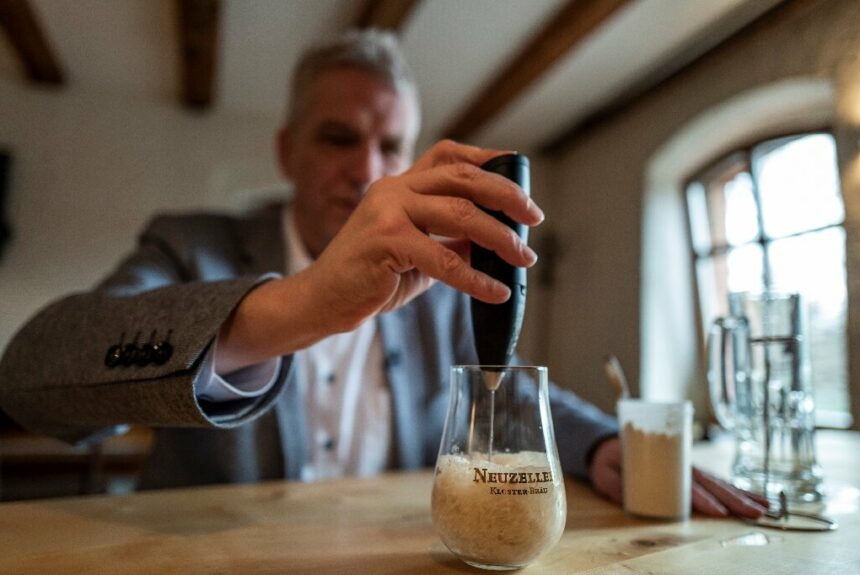A German brewery has invented the world’s most sustainable beer by tapping into just two simple ingredients: beer powder and water. Neuzeller Klosterbräu, a 500-year-old monastic brewery in East Germany, invented the powdered lager in order to help reduce the industry’s packaging and transport demands, the two largest factors contributing to beer’s heavy environmental impact. Experts estimate drinking one 355ml bottle of beer is equivalent to driving 0.8 miles in a car.
>>>READ: How one Scottish Distillery is Funding Environmental Research
So how does the magic happen? Simply mix Neuzeller’s powder with water, give it a nice stir, and–voilà!–you just made your own beer from home. Neuzeller General Manager Stefan Fritsche advises using a handheld whisk to blend the two ingredients and achieve an optimal head of foam.
For now, the powder yields a non-alcoholic beverage. However, Neuzeller plans to introduce an alcoholic version to international markets in the near future.
“We want to become the first sustainable brewery in the world,” Fritsche told AFP News.
By eliminating the extra weight produced by glass and water, Neuzeller claims its powdered beer could slash transport weight by 90%. The powdered format is also more accessible. With the creation, anyone can have their own “home brewery.”
The product is expected to roll out commercially sometime in the fall.
Not only does the innovation promise massive savings on transport, but the concoction is most importantly a sustainable alternative to the classical beer business model. According to the Impact CO2 carbon footprint calculator, packaging and transport account for over two-thirds (70%) of the total environmental impact of a liter (around two pints) of beer.
In fact, packaging alone is responsible for a remarkable 40% of the carbon footprint of beer, according to a whitepaper from container solutions company Thielmann. The most notorious culprits in the industry are single-use glass bottles and aluminum cans, with the former emitting a whopping 0.45 kg of carbon dioxide (CO2) emissions per liter of product. Swapping glass bottles for reusable stainless steel kegs narrows that value down to 0.05 kg CO2 eq. per liter of product. Transporting beer in a powdered format is even more sustainable.
In total, alcoholic beverages like beer account for 0.6% of the Global Warming Potential (GWP) impact category of all products, Thielmann found.
Neuzeller is not the first brewer to go green. Major beer brands like Coors and New Belgium have implemented sustainable processes to attract climate-conscious consumers and lower their respective environmental footprints. Coors, for instance, announced it would eliminate plastic rings from all of its global packaging last spring, a decision that will save 1.7 million pounds of plastic annually. Meanwhile, New Belgium’s iconic Fat Tire Ale craft beer got a carbon-neutral rebrand this January in homage to its zero-emissions production process.
>>>READ: Consumer Preferences for Climate-Friendly Products are Booming
Other brewers improving their sustainability credentials include Amsterdam-based Heineken, which aims to be fully carbon-neutral in its production process by 2030. In Spain, Heineken is powering its brewing operations with solar power and will exchange its gas boilers for biomass ones. Mega-brewer Carlsberg is also taking steps to protect the environment. In addition to phasing out the use of plastic ring can holders in 2018, the Danish beer brand has partnered with the World Wildlife Fund to restore native seagrass around the UK coastline. These meadows can absorb carbon up to 35 times faster than a tropical rainforest, making it an important climate solution.
Given that beer is the world’s alcoholic beverage of choice, any advancements in the industry have the potential to make a significant impact in addressing climate change. Neuzeller’s next-generation powder is just the latest example of how the private sector is working hard to meet the climate needs of our day.
Nathalie Voit is a freelance content creator and a graduate of the University of Florida. She is an alumni of The Heritage Foundation’s Young Leaders Program.
The views and opinions expressed are those of the author’s and do not necessarily reflect the official policy or position of C3.
